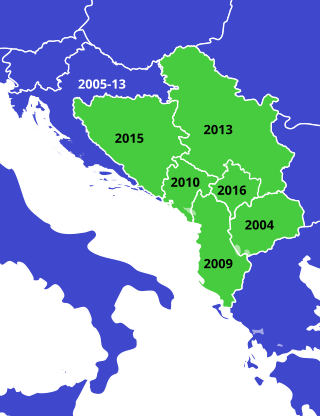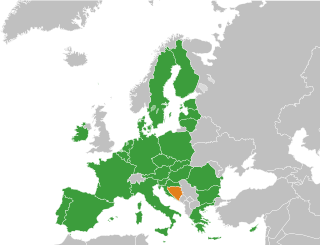
The European Union (EU) has expanded a number of times throughout its history by way of the accession of new member states to the Union. To join the EU, a state needs to fulfil economic and political conditions called the Copenhagen criteria, which require a stable democratic government that respects the rule of law, and its corresponding freedoms and institutions. According to the Maastricht Treaty, each current member state and the European Parliament must agree to any enlargement. The process of enlargement is sometimes referred to as European integration. This term is also used to refer to the intensification of co-operation between EU member states as national governments allow for the gradual harmonisation of national laws.
The European Union has a number of relationships with foreign states. According to the European Union's official site, and a statement by Commissioner Günter Verheugen, the aim is to have a ring of countries, sharing EU's democratic ideals and joining them in further integration without necessarily becoming full member states.

The Treaty of Accession 2003 was the agreement between the member states of the European Union and ten countries, concerning these countries' accession into the EU. At the same time it changed a number of points which were originally laid down in the Treaty of Nice. The treaty was signed on 16 April 2003 in Athens, Greece and it entered into force on 1 May 2004, resulting in enlargement of the European Union with 10 states.

In talks with countries that have expressed a wish to join the European Union, the EU typically concludes Association Agreements in exchange for commitments to political, economic, trade, or human rights reform in that country. In exchange, the country may be offered tariff-free access to some or all EU markets, and financial or technical assistance.

The most recent enlargement of the European Union saw Croatia become the European Union's 28th member state on 1 July 2013. The country applied for EU membership in 2003, and the European Commission recommended making it an official candidate in early 2004. Candidate country status was granted to Croatia by the European Council in mid-2004. The entry negotiations, while originally set for March 2005, began in October that year together with the screening process.

Instrument for Structural Policies for Pre-Accession (ISPA) is one of the three financial instruments of the European Union to assist the candidate countries in the preparation for accession. It provides assistance for infrastructure projects in the EU priority fields of environment and transport.
SAPARD (Special Accession Programme for Agriculture and Rural Development) was a financial assistance program established in June 1999 by the Council of the European Union to help countries of Central and Eastern Europe deal with the problems of the structural adjustment in their agricultural sectors and rural areas, as well as in the implementation of the acquis communautaire concerning the Common Agricultural Policy (CAP) and related legislation.
The CARDS programme, of Community Assistance for Reconstruction, Development and Stabilisation, is the EU's main instrument of financial assistance to the Western Balkans, covering specifically the countries of Croatia, Bosnia and Herzegovina, Serbia, Montenegro, North Macedonia, Kosovo and Albania. It was created in 2000 by Council Regulation 2666/2000. However it was only in 2001 that the programme became operative under its own regulations, as in the first period it supported projects previously funded by the PHARE and OBNOVA programmes. The programme is the main financial instrument of EU's Stabilisation and Association process (SAp). A total of €5.13 billion is secured for all CARDS actions during 2000-2006, as after that day it will be replaced by the Instrument for Pre-Accession Assistance (IPA), which will cover both candidate and potential candidate countries.

The Directorate-General for Neighbourhood and Enlargement Negotiations is a Directorate-General of the European Commission. The body is responsible for the enlargement process of the European Union and for the European Neighbourhood Policy. The European Union over the years has expanded to 27 members from the first six Member States who signed the Treaty of Rome.

Albania is on the current agenda for future enlargement of the European Union (EU). It applied for EU membership on 28 April 2009, and has since June 2014 been an official candidate for accession. The Council of the European Union decided in March 2020 to open accession negotiations with Albania.

The accession of Bosnia and Herzegovina to the European Union is the stated aim of the present relations between the two entities. Bosnia and Herzegovina has been recognised by the EU as a "candidate country" for accession since the decision of the European Council in 2022 and is on the current agenda for future enlargement of the EU. Bosnia and Herzegovina takes part in the Stabilisation and Association Process and trade relations are regulated by an Interim Agreement.
The Instrument for Pre-Accession Assistance, or simply IPA, is a funding mechanism of the European Union. As of 2007, it replaced previous programmes such as the PHARE, ISPA, SAPARD and CARDS. Unlike the previous assistance programs, IPA offers funds to both EU candidate countries and potential candidates.
European Union (EU) concepts, acronyms, and jargon are a terminology set that has developed as a form of shorthand, to quickly express a (formal) EU process, an (informal) institutional working practice, or an EU body, function or decision, and which is commonly understood among EU officials or external people who regularly deal with EU institutions.

The largest expansion of the European Union (EU), in terms of number of states and population, took place on 1 May 2004.

Since the 1980s, member states of the European Union have started to harmonise aspects of the designs of their ordinary passports, as well as common security features and biometrics.

The Berlin Process is an intergovernmental cooperation initiative linked to the future enlargement of the European Union.

Poland has been a member state of the European Union since 1 May 2004, with the Treaty of Accession 2003 signed on 16 April 2003 in Athens as the legal basis for Poland's accession to the EU. The actual process of integrating Poland into the EU began with Poland's application for membership in Athens on 8 April 1994, and then the confirmation of the application by all member states in Essen from 9–10 December 1994. Poland's integration into the European Union is a dynamic and continuously ongoing process.
This is a timeline of the relations between Hungary and the European Union (EU), since the transition in Hungary in 1989-90.

The Strategy for the Western Balkans is a policy pursued by the EU with its partners and accession candidates in the western region of the Balkan Peninsula. Announced by European Commission President Jean-Claude Juncker in his 2017 State of the Union address, this policy brings together the objectives of the global strategy for CSDP and the enlargement policy specific to the states in this region.











